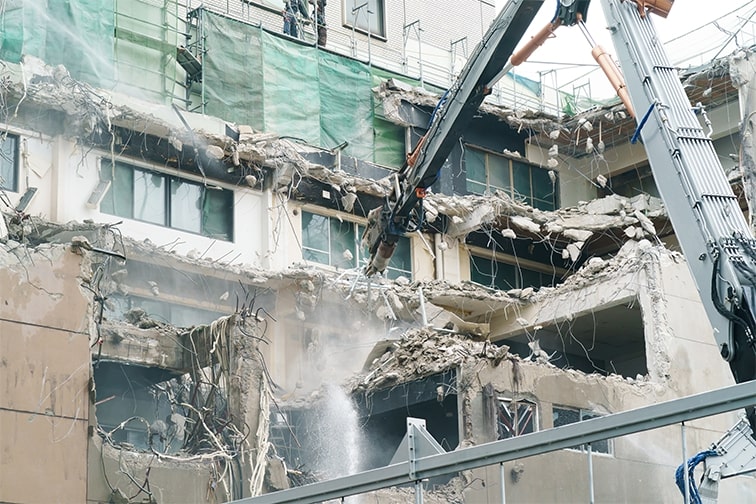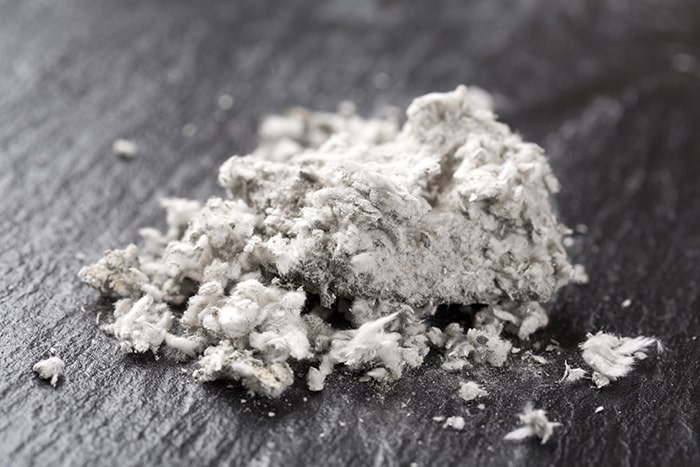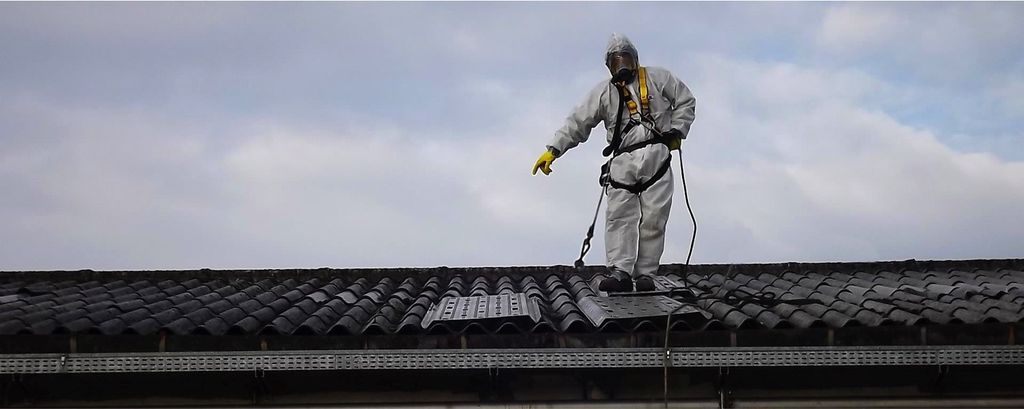ADVICE AND ANALYSIS OF ASBESTOS
Asbestos, a practical but very dangerous material
For decades, asbestos, which is hazardous to health, has been used in various compositions as a building material and has now proved to be a huge disposal problem. Although asbestos has not been used and marketed throughout Europe for many years, it can be found in many places, especially in older buildings, due to its uses in technical applications, its resistance to fire and acid and other excellent material properties.


Asbestos fibres are usually bound in an integrated form. The fibres can be released especially during weathering, renovation and demolition work. Even with light renovation work – for example drilling a hole or breaking up asbestos insulation boards – asbestos can be inhaled. The finest asbestos dust represents a high health risk, even in the smallest quantities, which is why only specialised companies should be used for such work and, at best, the whole building should be cleared of asbestos. This is the only way to exclude future risks for residents and workers.

ASBESTOS REMOVAL
There are not only strict legal provisions for renovation, demolition work and final cleaning of buildings or parts of buildings due to asbestos contamination. Regulations must also be observed when handling asbestos-containing materials following work.
Asbestos waste is packaged in a dust-proof manner and must be disposed of as hazardous waste. All these factors contribute to the sometimes considerable costs associated with the removal of asbestos from buildings. As a general rule, renovation work due to asbestos pollution can be claimed for operational properties if the above-mentioned report is available before the renovation begins.
However, a property owner should never fear the costs of asbestos removal.
STRICT LEGAL REQUIREMENTS APPLY TO ASBESTOS REMOVAL
The use of asbestos and the use of asbestos products have been strictly prohibited throughout the European Union and in Switzerland for several years due to clearly established health risks. A few decades ago, however, asbestos was used without hesitation in a wide variety of industries, including the construction sector. Asbestos, which is extremely hazardous to health, is now primarily a huge site of contamination and an expensive disposal problem.
In the course of demolition, renovation and maintenance work on buildings, workers, employees, responsible persons and even residents may come into contact with asbestos fibers, which must be avoided at all costs and the current legal safety regulations must be observed.
Against floating hazard in buildings:
Even though asbestos products have been banned from manufacture and the marketplace for years, it is not uncommon for certain professionnal groups to come into contact with asbestos products. This is especially true for employees in the plumbing, heating, air conditioning and construction trades, as asbestos was introduced because of its excellent technical properties (heat and acid resistance, high strength, better insulation properties) until the 1970s and 1980s. Spray asbestos, used for insulation and fire protection, is particularly dangerous. Sprayed asbestos is a weakly bonded material and can therefore very easily release carcinogenic asbestos fibres.
There is a real risk if asbestos fibers are released, however :
Homeowners wishing to get rid of the harmful effects of asbestos should be aware of the potential risks involved in renovation. Indeed, even small activities or repairs should not be done by yourself. Besides the fact that this is not allowed either, this is where most of the asbestos contamination occurs. In order to be able to better assess the potential danger and clarify a possible solution, it is imperative to consult experts in the private sector. The first point of contact can be the building and/or environmental authorities of your place of residence. Upon request, they will appoint interested or assigned certified experts to assess a potential asbestos risk
In the case of a specific renovation project, a specialized company must be commissioned without exception. All asbestos removal work is subject to legal regulations that must be strictly adhered to by the owners or the company performing the asbestos removal.
Failure to comply with safety requirements when removing asbestos sources will result in penal proceedings and far-reaching liability exclusion under insurance law.
Contact us if you have any questions about asbestos removal.
POLLUTANT REPORTS
It is advisable to have a pollutant report completed before beginning asbestos removal. The concentrations of asbestos in the ambient air are measured by an expert and the individual components are examined in detail. Based on the results of the report, a special concept for the renovation of a building is developed in order to keep the effort and thus the costs as low as possible. Such pollutant reports are offered, which makes the costs of asbestos removal assessable and offers the client additional legal protection from environmental laboratories.
- Asbestos or asbestos products in buildings may, for example, have been contained or installed in the following areas
- Ventilation, extraction and smoke extraction ducts
- Fire dampers, fireproof cladding
- Fire door infill or cladding
- Pipes, fittings, ventilation and electrical ducts
- Linings for electrical installations, electrical cabinets
- Cable ducts and cable trays
- Insulation for night storage heaters
- Jackets and insulation for heating boilers
- Sealing cords and flat seals (red seals)
- Textile mats, asbestos seals and cords
- Floor insulation
- Lining and covering of spacers, supports and beams in concrete, steel or wood
- Façade cladding, façade panels and roofing
- Corrugated roof sheets, roofing sheets and shingles
- Roof and wall coverings
- Lightweight panels and exterior wall cladding
Once all asbestos fibre residues have been completely removed as part of the renovation and subsequent thorough cleaning of the asbestos-removed building, prescribed breathing air monitoring measurements are performed. If the exposure limit values are not reached during the release measurement, the building in question can be reinstated and used normally.




